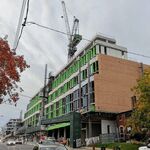tendim
New Member
I haven't been able to find anything concrete on any of this, so I thought I'd throw it out to the experts. 
Which businesses, in everyone's opinion, spur gentrification? Even better, based on geographic footprint? I.e., some areas can support large scale operations (upscale grocery stores), and some can only support small footprint (coffee shops).
Anecdotally I've heard that Starbucks spurs a lot of growth because it has as higher price point, so the type of people that shop there spend more, but those who are low-income can't so they have to go elsewhere. This type of action causes them to move out of an area completely.
Another example was when I was reading the Daniel's Corp. threads about the new developments near Regent Park. There was a lot of talk about how, since Sobey's was there, it would force lower income people out.
But I've been thinking, even if you throw in one new place (I.e., Starbucks), if the rest of the stores around it don't support a high price point or "Starbuck-esque" customers (to use a very broad brush: on average I don't see Starbucks people walking into the "tacky discount stores"), what happens? Does the new business fold, or does it bring in other businesses behind it because someone has taken the chance and lead the way?
Any comments appreciated.
-10d
Which businesses, in everyone's opinion, spur gentrification? Even better, based on geographic footprint? I.e., some areas can support large scale operations (upscale grocery stores), and some can only support small footprint (coffee shops).
Anecdotally I've heard that Starbucks spurs a lot of growth because it has as higher price point, so the type of people that shop there spend more, but those who are low-income can't so they have to go elsewhere. This type of action causes them to move out of an area completely.
Another example was when I was reading the Daniel's Corp. threads about the new developments near Regent Park. There was a lot of talk about how, since Sobey's was there, it would force lower income people out.
But I've been thinking, even if you throw in one new place (I.e., Starbucks), if the rest of the stores around it don't support a high price point or "Starbuck-esque" customers (to use a very broad brush: on average I don't see Starbucks people walking into the "tacky discount stores"), what happens? Does the new business fold, or does it bring in other businesses behind it because someone has taken the chance and lead the way?
Any comments appreciated.
-10d




